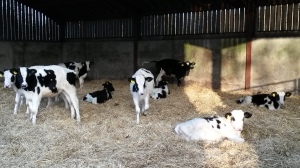The long summer is over, the rains have come, some mornings there is a light frost, and it’s time to bring the cows in.
When I asked a local farmer why the cows are brought in, the first thing he said is, “Because otherwise they get miserable.”
A miserable cow is an unproductive cow.
Although sheep, thanks to their thick woolly coats, seem fairly impervious to the weather, cows do not like the cold and wet. They will huddle together, in or by a thicket for shelter if possible. They lose condition because energy from their food is being spent to keep them warm. Their milk yield decreases for the same reason or, if they are beef cattle, they do not put on weight so quickly.
At the same time, as any gardener knows, the grass has stopped growing so livestock need to be fed. The shortened grass is more of a problem for cows than for sheep because of the way they eat. Sheep have a very mobile upper lip which they use to gather up a bit of grass and then nip it off with their incisors. Cows rely on using their tongues to grasp a clump of grass and then bite it off. The lack of grass together with the need for more food to keep warm means they need to be fed, and that feed needs to be carted from the yard where it is stored up to the field…the first reason why it is simply easier, less exhausting and time consuming, and more cost effective to feed cows in barns in the yard.
Another reason is that cows can get so miserable and cold that they simply will not come when summoned by the horn of the Land Rover. Sheep do.
The short days mean that the sun rises after the morning milking has finished, and it sets before the afternoon milking: this leaves little time for the multiplicity of jobs so saving some time by having the cows in helps. Some herds are kept in the whole time until March but the local herd is allowed out to play after the morning milking and brought in for the night at the afternoon milking. Milking is an essential opportunity for the welfare of the individual cows to be checked. Imagine checking a herd on a dark, wet, and stormy night on a muddy hill. Imagine trying to help a cow in distress in those conditions! All much easier for both humans and cows if they are inside.
There is also the welfare of the pasture to consider. As the grass is not growing and it is very wet, ‘poaching’ can occur. When soil becomes poached it is compacted with no air spaces to nurture the soil organisms and microbes that help maintain a healthy sward. The grass will not grow so well, and the turf will become full of hardy weeds.
So for the welfare of the grass, the cows, and the humans working with them the cows are brought in in the winter.
